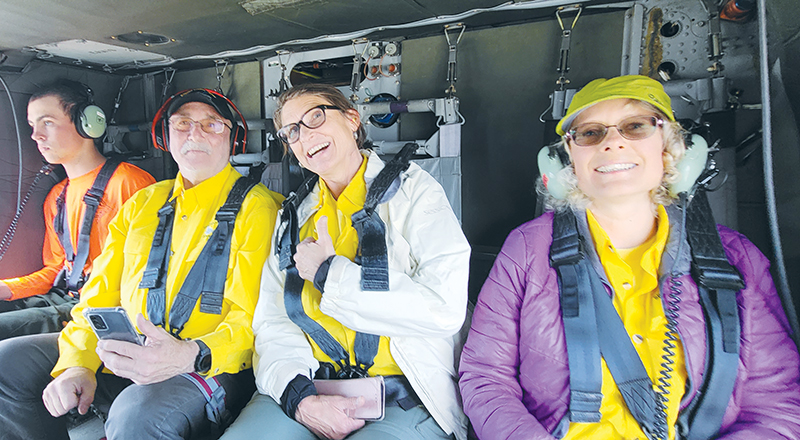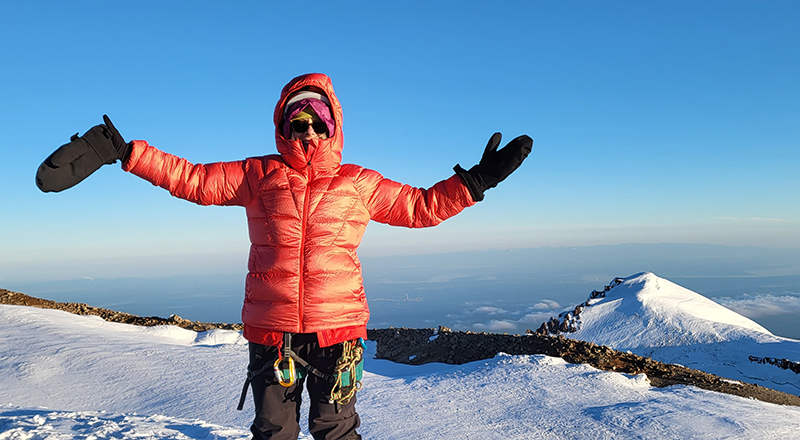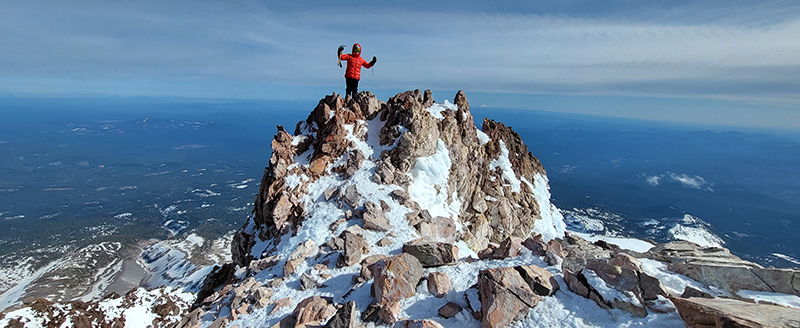
Rosana Slezeviciute knew the moment she interviewed to become the chaplain of Mercy Medical Center Mount Shasta in Northern California that she'd found a place she could really call home.
As the sole chaplain at the rural mountain town's only hospital since 2016, Slezeviciute has found a warm, interconnected community and a chance to engage with others intimately through her healing profession — all against the backdrop of one of the tallest peaks of California's Cascade mountain range.
She's also found plenty of outlets for her love of nature — and adventure. She's a regular on the hiking and climbing routes around Mount Shasta and is a member of the community's volunteer search and rescue team.
She says immersing herself in the small community and helping people through both her chaplain and mountain rescue roles have been rewarding. "I fell in love with Mount Shasta," she says of the community.
Personal connection
Originally from a small village in Lithuania in eastern Europe, Slezeviciute first lived in Boston and San Francisco after arriving in the U.S. in 1999. In both, she'd longed to live in a smaller community, where
she could really feel a connection with others.
"I chose Mount Shasta because of the people," says Slezeviciute. "When I interviewed here, I saw that everyone was so friendly. And then once I accepted the job and moved here, I've really enjoyed getting to know people at the hospital and at my church."
And, she says serving at a small hospital, "I get to spend more time with patients (as compared to a big facility). I get to know the other people who work here. There is time to listen. I become part of their lives, and we get to know each other."
The other main boon of living in this rural mountain town is the surroundings, she says. "It is like being in heaven here, it is so beautiful. We have the mountains, the lakes, the forest. Around here we love hiking, and skiing and climbing."

The great outdoors
Seven years ago, she accepted an invitation to give back to the mountain community by joining the search and rescue team, a voluntary role. In monthly trainings, she's learned how to assist with cave, river,
mountain, lake and forest rescues. She's learned to use snowmobiles and other rescue vehicles. She's been trained in administering first aid, in navigating the vast Mount Shasta wilderness, and in survival techniques. She's on a search and rescue
team pager around the clock.
There are all kinds of situations that she and her fellow search and rescue team members encounter, such as adventurers lost or injured in the back country, elderly people who have become disorientated and off course, people stuck in the snow. She knows how to dig a hole in the snow for shelter, to use ropes to immobilize a person during a rescue, to cross a mountain crevice with a ladder and to ration food for survival.
She's aided in both rescues and recoveries. She's joined in some families' joy upon a loved one's rescue. And she's comforted families whose loved ones have not survived.
Slezeviciute says her most difficult search-and-rescue mission was to respond to California's deadliest wildfire, the 2018 blaze in Paradise, California, which is about 150 miles south of Mount Shasta. That fire killed at least 85 people, covered 153,336 acres and destroyed more than 18,000 structures, including homes.
Slezeviciute's team was among the numerous groups from around the region called in to help Paradise responders. Slezeviciute says it was devastating to search that ravaged community for survivors. "It was really hard emotionally," she said. "There was so much sadness, grief and pain."
For difficult rescue missions and for the many emotionally taxing days as a chaplain, she's learned to draw on the strength of her circle of supporters, including friends and colleagues in Mount Shasta's faith community.

Catholic renaissance
Even Mount Shasta, with its population of 3,000, is large compared with the Eastern European farming village where Slezeviciute was born and raised. Betygala, in central Lithuania, has a population of just
several hundred people. Slezeviciute and her twin sister were the oldest of nine children on a family farm. Growing up in the 1970s and 1980s, Slezeviciute shouldered much of the work of tending animals — and her siblings — while her
parents cared for her twin. That sister had medical conditions that kept her hospitalized much of her youth.
For much of Slezeviciute's childhood, Lithuania was part of the Soviet Union, whose leadership was intent on squelching Lithuanian pride and Catholic practice. But she witnessed a passionate defense of Christianity among members of her community. Some risked imprisonment and death erecting mass displays of crosses, for instance. She gravitated to her grandparents' own furtive practice of Catholicism, internally embracing the faith. So, when the Soviet Union dissolved in 1990, and Lithuania became the first Soviet republic to declare its independence, Slezeviciute was eager to take part in the Catholic renaissance that followed.
Initially interested in becoming a religion teacher, she took a leap of faith and accepted a scholarship in 1999 to study at Boston College. Slezeviciute says life in the huge U.S. city was a culture shock with throngs of people everywhere, grocery and retail stores packed with limitless options, and restaurants of every type close by.
New calling
Returning to Lithuania after her studies, Slezeviciute found herself consumed with learning how to use spiritual practices to comfort her ailing twin, who had carcinoma. On the advice of a priest she knew, Slezeviciute
decided to pursue clinical pastoral education in the U.S. She earned a graduate degree in San Francisco and in 2008, during her second year of studies, she accepted a chaplain position at Seton Medical Center in Daly City, California, outside
San Francisco.
While she knew she'd found the career she was meant to have, the setting of that first position was not ideal for her. At the large urban medical center, it was hard to get to know staff and patients individually.
The facility where Slezeviciute served was part of the Daughters of Charity Health System of Los Altos Hills, which was bought by a private investment firm in 2016. Her position was eliminated in 2015 in the leadup to the divestiture.
During her interview for the chaplain position at Mercy Medical Center Mount Shasta, a CommonSpirit Health facility, she was enamored by the welcoming community. And during the eight years she's worked there, she's built a close circle of friends at the critical access hospital, at her church and in the community.
Slezeviciute says the Mount Shasta community feels like a family. In her role as chaplain, she says she greatly appreciates that she knows most of her colleagues and patients by name. She knows their families. She knows their struggles.
Lasting impact
Slezeviciute laughs that the one of the few downsides of being a chaplain in such a small community is that everyone knows you, and so you must be on your best behavior. There's no cutting people off in traffic
and no driving on snow-covered mountain roads without the legally mandated snow tire chains.
She says her favorite aspect of her role is to comfort the many people who turn to the hospital for care, whatever their faith background. She says that even for people who have no faith or who are angry with the church, she hopes that the kindness and love she shows them opens their minds to faith.
"I am so proud to be in Catholic health care because I've always stuck to the phrase that the best way to live your faith is to practice it," she says.
